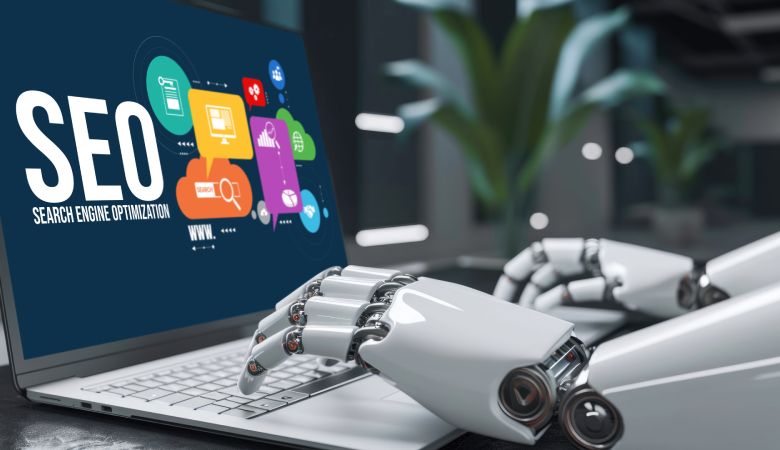How AI is Reshaping the Traditional SEO Agency Model
AI-powered platforms are revolutionizing the economics of SEO—reducing costs, automating expertise, and forcing agencies to adapt quickly or risk obsolescence.
This transformation threatens to disrupt the traditional SEO agency model in three key ways:
- Drastically reduced costs.
- Automation of technical capabilities.
- Delivery of unbiased, data-driven decisions.
However, this disruption may also lead to industry consolidation, with fewer but larger agencies emerging to serve a growing market of SEO adopters.
The Disruptive Economics of AI in SEO
The current SEO agency model typically relies on monthly retainers ranging from 2,000to20,000, depending on the scope and complexity of services.
Even at premium pricing, AI-powered platforms can deliver comparable—or superior—results for a fraction of the cost, potentially charging just 500to2,000 monthly.
This significant price difference doesn’t merely create competition; it challenges the very sustainability of traditional agency pricing structures.
Consider a mid-sized ecommerce site currently paying $5,000 monthly for SEO services.
An AI platform could provide automated technical audits, content optimization suggestions, and competitive analysis for as little as $750 monthly.
Even if the platform doubled or tripled its fees, it would still be significantly more cost-effective than traditional SEO agencies.
Moreover, these platforms empower in-house marketers with enough SEO strategies to handle tasks independently, maximizing their internal budgets.
For SEO agencies, this poses a serious threat.
When clients can opt for an AI platform over an agency, the traditional agency model faces a critical challenge.
The Rise of Automated Technical Expertise
The technical capabilities of AI platforms represent the most immediate threat to traditional SEO agencies .
These systems can now:
- Automatically detect and prioritize technical SEO issues.
- Generate and implement fixes for common problems.
- Monitor site health in real time.
- Adapt to algorithm updates faster than human teams.
- Analyze competitor code changes to assess their impact across sites.
This automated approach undermines the value of traditional technical SEO expertise.
For instance, we recently used AI to uncover code-related issues on a client’s site that traditional SEO tools failed to detect.
As AI becomes more integrated into web and SEO platforms, the need for human technical expertise will diminish.
This isn’t speculation—no-code platforms already demonstrate this trend.
The advantage technical SEO experts once held was their ability to identify what needs fixing and when, based on experience.
But in an era of AI-driven websites capable of achieving technical perfection and even “self-healing” code issues, the role of tech SEO risks becoming obsolete.
The Future of SEO Agencies in an AI-Driven World
As Google Search continues to evolve with features like Google’s AI Overviews and the SGE (Search Generative Experience) , the pressure on agencies to adapt intensifies.
AI isn’t just a tool—it’s rewriting the rules of the game, forcing SEO professionals and agencies to rethink their value proposition.
Those who fail to embrace automation and generative AI risk being left behind in this rapidly changing landscape.
The Trust Factor (No More Empty Promises)
The SEO industry has long been plagued by spam.
A quick online search reveals countless promises of instant rankings for a low monthly fee.
It’s no surprise that agencies often prioritize their own interests, selling unrealistic dreams that ultimately harm the industry one client at a time.
However, SEO-powered platforms are changing this dynamic.
These platforms deliver unbiased, data-driven advice.
They can track links being added, content changes, and technical fixes while monitoring the impact of these actions across industries.
This feedback loop allows them to provide objective, non-agency recommendations.
And don’t assume this isn’t already happening.
Soon, AI (Artificial Intelligence) tools will be able to analyze any website, document all changes, and measure their effect on Google Search rankings.
It’s only a matter of time—weeks, months, or perhaps a few years. But it’s inevitable.
Alright, enough about the challenges.
What should you do?
The Agency Response
SEO agencies cannot afford to remain passive in this evolving landscape.
The past few years have been tumultuous for the SEO and content industry, with freelancers thriving as agencies struggle to adapt and grow.
Yet, much of this was influenced by an artificial boom post-COVID-19, which caused agencies to expand faster than they naturally would have.
This was followed by an overcorrection due to global economic pressures.
Now, we’re entering a lean phase in SEO where automation and AI efficiencies will favor the largest and most powerful agencies.
The most successful agencies will likely be those that:
- Build strong brand recognition and trust.
- Operate at scale with minimal overhead.
- Seamlessly integrate generative AI with human expertise.
- Deliver value beyond what automated platforms can offer.
But even these efforts will face direct competition from SEO platforms themselves.
The very tools agencies rely on to perform their jobs will soon compete directly for clients.
This is the natural progression.
Think of DIY outlets—they cater to professionals but also sell directly to consumers.
This is the direction the industry is heading.
Adapting to the AI Revolution
As Google’s AI Overviews and SGE (Search Generative Experience) reshape traditional SEO , agencies must rethink their strategies.
The rise of AI doesn’t spell the end of SEO agencies , but it demands a shift toward combining SEO strategies with advanced technology.
Agencies that fail to embrace this change risk being left behind in an increasingly competitive market.
The future belongs to those who can leverage AI while maintaining the human touch that builds trust and delivers exceptional results.
The Future of the SEO Market: A Paradoxical Evolution
The SEO market is on track for a paradoxical transformation.
As AI (Artificial Intelligence) platforms make basic SEO more accessible, we’re likely to witness:
- More businesses investing in SEO due to reduced entry barriers.
- Fewer jobs in traditional SEO , as automation takes over repetitive tasks.
- A smaller number of larger, highly efficient SEO agencies dominating the space.
- Higher overall market value, though distributed unevenly across the industry.
In this new landscape, success won’t hinge on having the best technical capabilities—AI platforms will largely commoditize those.
Instead, victory will favor agencies that build the strongest brands and operate with maximum efficiency, potentially creating a winner-takes-all scenario in the agency space.
This sets the stage for a unique battle.
AI enables individual freelancers or lean agencies to become far more profitable while reducing their reliance on extensive teams.
In an industry where expertise becomes less of a barrier, agencies that acquire customers faster and scale efficiently will dominate.
These agencies will essentially act as branded wrappers for the same “behind-the-scenes” mechanics used by all competitors.
What will set them apart?
Branding, reach, and visibility will be the ultimate differentiators.
Today, most agencies lack distinct branding and appeal. In the future, agencies will deliberately craft standout identities.
Marketing the agency itself will become a critical strategy.
Increased efficiencies will lead to higher profits, which can then be reinvested into building a stronger brand and delivering exceptional customer experiences.
Clients will likely choose agencies based not just on expertise but on who they want to work with, influenced by experiential factors.
For instance, while remote work dominates the SEO sector, having an office that clients are eager to visit—perhaps even traveling by train or plane—could become a significant advantage.
Your office and brand will serve as costly signaling factors, communicating your agency’s value in a crowded market.
As British advertising executive Rory Sutherland famously said:
“All-powerful messages must contain an element of absurdity, illogicality, costliness, disproportion, inefficiency, scarcity, difficulty, or extravagance—because rational behavior and talk, for
all their strengths, convey no meaning.”
In the future, your brand and office will become powerful signals of your agency’s identity and value.
SEO Agencies in an AI-Driven World
As Google Search evolves with features like Google’s AI Overviews and SGE (Search Generative Experience) , SEO strategies must adapt.
Agencies leveraging generative AI alongside human insight will thrive.
But the real competitive edge will come from how well they market themselves and create memorable client experiences.
In this transformed landscape, standing out isn’t just about expertise—it’s about becoming a brand clients trust and want to engage with.
The Evolving SEO Landscape
The transformation of the SEO (Search Engine Optimization) industry won’t happen overnight, but the signs are already clear.
As AI (Artificial Intelligence) platforms grow more sophisticated, a four-tiered market is likely to emerge:
- Enterprise Level
Large, well-branded agencies will cater to corporations, blending automation with high-touch service and strategic oversight.
These agencies will command premium prices while operating with leaner teams than today’s firms.
- Mid-Market Solutions
AI platforms will serve as the primary SEO strategies provider for mid-sized businesses, requiring minimal human intervention.
These platforms will deliver advanced automation at a fraction of the cost of traditional SEO agencies.
- Small Business Market
Democratized access to SEO tools and generative AI -driven recommendations will empower small businesses to manage their SEO independently, with little need for external support.
- Small Agencies and Freelancers
They will target the remaining market—clients who don’t want to handle SEO themselves or lack the time.
This structure may resemble today’s market, but AI efficiencies will enable larger agencies to become far more profitable.
For example, today’s 60-person agency could downsize to 20 people, using its profits to scale, acquire customers, and strengthen its brand.
Adding AI platforms introduces a new level of competition, particularly against smaller agencies operating in niche markets.
Industry Implications
This restructuring will have profound consequences.
SEO professionals must transition from technical practitioners to strategic advisors and AI platform specialists.
Agencies must either scale significantly to compete at the enterprise level or drastically reduce overhead to remain viable in the mid-market.
The silver lining? The overall SEO market is likely to expand.
Lower barriers to entry and more affordable solutions will attract new businesses to adopt SEO.
However, this growth will be unevenly distributed. AI platforms will capture a larger share of mid-market revenue, while mega-agencies dominate the enterprise space.
Partner with our Digital Marketing Agency
Ask Engage Coders to create a comprehensive and inclusive digital marketing plan that takes your business to new heights.
Why This Matters
While human expertise will still hold value, the traditional agency model—relying on high overhead and technical service delivery—will likely become unsustainable for all but the largest, most efficient firms.
For agency owners, the message is clear: adapt now or face obsolescence.
This might involve investing heavily in brand building, slashing operational costs, or pivoting to specialize in AI platform implementation and optimization.
The future belongs not to those with the best technical skills but to those who can build the strongest agency brands and most efficient operations.
That’s the harsh reality.
The future of SEO will be defined by extravagant and distinctive agency brands powered by highly efficient, profitable models.
Are you prepared for this shift?







